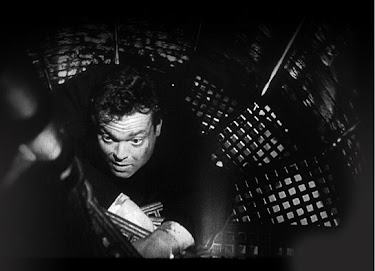Directed by: Josef von Sternberg
Written by: John Colton (play), Josef von Sternberg (adaptation), Geza Herczeg, Jules Furthman, Karl Vollmöller
Starring: Gene Tierney, Walter Huston, Victor Mature, Ona Munson, Phyllis Brooks, Albert Bassermann, Eric Blore
Having just watched The Shanghai Gesture (1941), I'm not even sure what to make of it. Was it a good film? Was it a complete mess? The 100 minutes unfolded like a drug-induced haze, the alluring scent of an opiate hanging thickly in the air. Somehow, the film's plot – whatever it may have been about – seemed totally and utterly inconsequential, with director Josef von Sternberg placing additional, almost superfluous, importance on the development of mood. Indeed, aside from atmosphere, there's little else to keep you watching the film: the characters are sleazy and grotesque, the sort you'd expect to find at a seedy casino, its employees imbued with the mock dignity of one who deals exclusively in exploiting the weaknesses of lesser men. A good cast – Walter Huston, Gene Tierney, Victor Mature, Eric Blore – is not exactly wasted on such poorly-developed characters, but one gets the sense that even they are not exactly sure what they're doing in this place. But, if the film is a failure, then it's a genuinely fascinating one.

"Mother" Gin Sling (Ona Munson, in unflattering Oriental make-up) is the mysterious and ruthless owner of a Shanghai casino, where desperate men come night or day to gamble their lives and fortunes. Employee Doctor Omar (Victor Mature) does his best to charm the beautiful girls who come his way, in one night snagging both smart-talking American Dixie (Phyllis Brooks) and conceited rich-girl "Poppy" (Gene Tierney). When threatened with closure by wealthy entrepreneur Sir Guy Charteris (Walter Huston), Gin Sling springs into action, using her enormous influence to rebuff the challenge. The Shanghai Gesture is sometimes categorised as film noir. Certainly, other noir pictures like Macao (1952), which Josef von Sternberg directed until he was replaced by Nicholas Ray, utilised a similarly exotic Asian setting, so the non-American locale doesn't immediately preclude it from consideration. In some ways, it fits the bill: every character in the film has a weakness – something to hide – through which they can be manipulated; a shady past that has come back to haunt them.

Despite being restricted by the provisions of the Production Code, The Shanghai Gesture is one of the sleaziest films of its era, leaving a bitter, uneasy taste in the mouth, despite impeccable production values. Hollywood's interpretation of Eastern cultural values was evidently unflattering, and every Asian character is utterly devoid of morals, with particularly prominence given to the proudly misogynistic attitudes of one Chinese employee who likes to brag of his polygyny. A shocking history of sex slavery is exposed, with New Year's Eve guests treated to a recreation of these ghastly practices (or, at least, we're told that it is merely a recreation). But it isn't only the Chinese whose immorality is exposed, and even the seemingly upright Sir Guy betrays a suspect past, doomed finally to suffer for his perceived sins. Walter Huston is excellent as always, bringing conviction to a film in which everybody else seems uncertain of their roles. Gene Tierney, perhaps her most ravishing performance outside Laura (1944), isn't particularly convincing, but her falseness does strangely work, given the desperate phoniness of her character.
6/10
Currently my #8 film of 1941:
1) Citizen Kane (Orson Welles)
2) The Maltese Falcon (John Huston) *
3) 49th Parallel (Michael Powell)
4) The Wolf Man (George Waggner)
5) Shadow of the Thin Man (W.S. Van Dyke)
6) Swamp Water (Jean Renoir)
7) High Sierra (Raoul Walsh) *
8) The Shanghai Gesture (Josef von Sternberg) *
9) Suspicion (Alfred Hitchcock) *
2) The Maltese Falcon (John Huston) *
3) 49th Parallel (Michael Powell)
4) The Wolf Man (George Waggner)
5) Shadow of the Thin Man (W.S. Van Dyke)
6) Swamp Water (Jean Renoir)
7) High Sierra (Raoul Walsh) *
8) The Shanghai Gesture (Josef von Sternberg) *
9) Suspicion (Alfred Hitchcock) *





_poster.jpg)


No comments:
Post a Comment